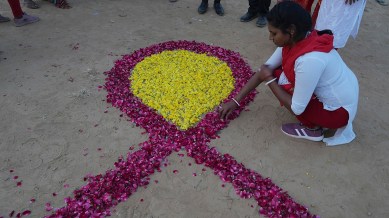Anonna Dutt is a Principal Correspondent who writes primarily on health at the Indian Express. She reports on myriad topics ranging from the growing burden of non-communicable diseases such as diabetes and hypertension to the problems with pervasive infectious conditions. She reported on the government’s management of the Covid-19 pandemic and closely followed the vaccination programme. Her stories have resulted in the city government investing in high-end tests for the poor and acknowledging errors in their official reports. Dutt also takes a keen interest in the country’s space programme and has written on key missions like Chandrayaan 2 and 3, Aditya L1, and Gaganyaan. She was among the first batch of eleven media fellows with RBM Partnership to End Malaria. She was also selected to participate in the short-term programme on early childhood reporting at Columbia University’s Dart Centre. Dutt has a Bachelor’s Degree from the Symbiosis Institute of Media and Communication, Pune and a PG Diploma from the Asian College of Journalism, Chennai. She started her reporting career with the Hindustan Times. When not at work, she tries to appease the Duolingo owl with her French skills and sometimes takes to the dance floor. ... Read More
How AI finds HIV hotspots faster and helps control infection spread
USAID mission director for India, Dr Steve Olive, on why India’s care template can work for others.

From an AI platform to detect HIV hotspots to an online platform providing mental health support to people who test positive for the infection, USAID mission director for India, Dr Steve Olive, feels India can control infection spread with a more personalised approach.
The USAID works with the government’s National AIDS Control Programme — by supporting its implementation, partnering with communities and working on innovations. In India, five in a lakh people get HIV every year, with nearly 25.4 lakh people living with it in 2023, according to a government report. Excerpts from an interview:
monthly limit of free stories.
with an Express account.
HIV numbers have been on the decline in India but what more is needed to prevent the spread of the infection?
The key to achieving epidemic control of HIV and AIDS is personalising the care rather than following an institutional approach. It’s one thing to know how to medically test for and treat the infection, quite the other to deal with mental health issues and worries associated with it. How do you connect with communities, with key populations, with people who are afraid to be exposed, and really personalise their experience?
You can imagine how devastating it can be for someone to discover they are HIV positive. Over the years, we have learnt that’s not the end, there are ways of living with HIV and suppressing the virus — something that people who are immediately diagnosed may not know about. So having platforms that can tell them this are so critical. The counsellors available on these platforms also keep them engaged, helping them get tested and treated over a long term.
I was really impressed by the stories of the folks that I had a chance to meet here. There were professionals who were able to carry on with their work not just because of the treatment they received for the virus but the mental health support as well. One of the folks started a family and is able to continue with it. Getting that reassurance and having a place where you can get the reassurance is so critical.
Could you talk about the innovations in this area?
I was in Thailand, which has very successful approaches to controlling HIV and AIDS. The number of infected people is low in India compared to what you might see, say, in Africa. But India has innovations and approaches that can be used by other countries.
We are using innovations such as Wadhwani AI that can determine hotspots for HIV or Evolve that is oriented to providing mental health support to the LGBTQ community. There is also SafeZindagi that has reached 160 million people through social media and dating websites. About 1.6 million of them have engaged with these platforms across 587 cities where we are working and 35,000 individuals are actively engaged in health activities through the platform. You get advice on how people can access treatment, where they can get the medicines they need, counsel them, and keep them engaged so that they continue their treatment.
How does the AI tool work?
Wadhwani AI scans media for disease emergence from more than 90,000 online news sources in 11 local languages. Once the AI determines where HIV hotspots might be popping up, then we, or the government can take targeted action in those areas. In 2023, the tool scanned 65 million articles and prevented an estimated 230 outbreaks.